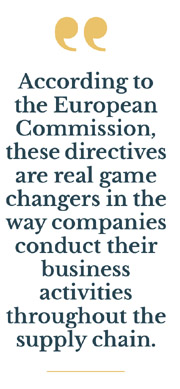Some of these legislative changes are already in effect, while others will soon be voted on. As a result, companies are struggling with an immense bureaucratic burden. Moreover, some are already faced with lawsuits based on these new legal requirements.
How did we get here?
It all started back in 2017 when the French Duty of Vigilance Law came into effect. This law requires large French companies to establish a “vigilance plan” that assesses and addresses human rights and environmental risks throughout their supply chains. It was the first law of its kind in Europe, and it gained a lot of attention. Soon, 15 lawsuits were filed against large French companies based on this law. Not much later, many European countries followed suit with their own versions of supply chain laws. These basically served as inspiration for the Corporate Sustainability Due Diligence Directive (CSDDD) at the EU level.
How can Slovak companies be affected?
One notable example of foreign national supply chain regulation which can impact companies in Slovakia is the German Supply Chain Due Diligence Act (Lieferkettensorgfaltspflichtengesetz, LkSG).
It has been in force since 1 January 2023. The LkSG not only applies to companies based in Germany but also impacts non-German companies in certain situations. As a consequence, Slovak companies that cooperate with German companies should not ignore this new law.
 For example, if a Slovak company is part of the supply chain of a German company subject to the law, it may be indirectly affected. German companies are required to conduct due diligence throughout their supply chains, which can extend to suppliers or subcontractors, including those in Slovakia. Slovak companies exporting products to Germany may be subject to scrutiny if their products are deemed to be associated with human rights violations or environmental harm.
For example, if a Slovak company is part of the supply chain of a German company subject to the law, it may be indirectly affected. German companies are required to conduct due diligence throughout their supply chains, which can extend to suppliers or subcontractors, including those in Slovakia. Slovak companies exporting products to Germany may be subject to scrutiny if their products are deemed to be associated with human rights violations or environmental harm.
Legislative initiatives at the European Union level
In addition to national supply chain regulation, the protection of human rights and the environment is also the subject of various legislative initiatives in the European Union.
Two EU directives are extremely important in this respect: the Corporate Sustainability Reporting Directive (CSRD), which has already been adopted and requires certain companies to report on sustainability, and the Corporate Sustainability Due Diligence Directive (CSDDD), which is in the proposal phase and would require companies to monitor actual or potential adverse impacts on human rights and the environment within their value chains. According to the European Commission, these directives are real game changers in the way companies conduct their business activities throughout the supply chain.
Although both directives will need to be transposed into the national laws of each EU Member State, many companies have already started with preparations to be compliant in time. Also, even if the company falls below the thresholds stipulated by the directives, it can be expected that small and medium-sized enterprises (SMEs) will also be affected indirectly. The large companies addressed will likely pass on the due diligence obligations imposed on them by law to their suppliers. So, if you are a small business that supplies to a large company, you will also have to consider how you conduct your business. First of all, there will be data and information which you will have to send to your partner companies. Also, if your business does indeed harm the environment or violate human rights, you will be unacceptable for companies with reporting duties.
What should companies do?
Our practical experience working with multiple clients across different industries tells us that companies tend to face similar challenges, in both the legal and strategic spheres, when managing supply chain compliance.
We would recommend a thorough process that starts with top-down risk analysis of all the relevant risks that the company faces. We suggest reviewing governance maps with respect to sustainability ownership. Identify any existing business practices that could be improved to demonstrate due diligence. When entering into new contracts or renewing existing ones, pay explicit attention to ESG requirements and identify them. Adjust your contracts in terms of ESG obligations, incorporate your contractual partners’ obligations regarding ESG disclosures and statements, and stipulate ESG criteria in contract clauses, as well as legal consequences if they are not satisfied.
Conclusion
Supply chain management is part of a regulatory trend, with the objective of getting companies to incorporate human rights and environmental protection into their entire supply chains. Given the proposed legislative amendments throughout Europe, it will certainly be one of the greatest ESG challenges for businesses in the coming years.
Soňa Hanková, Partner, CMS Slovakia
Ronald Filipčić, ESG Manager, CMS Croatia




Follow us